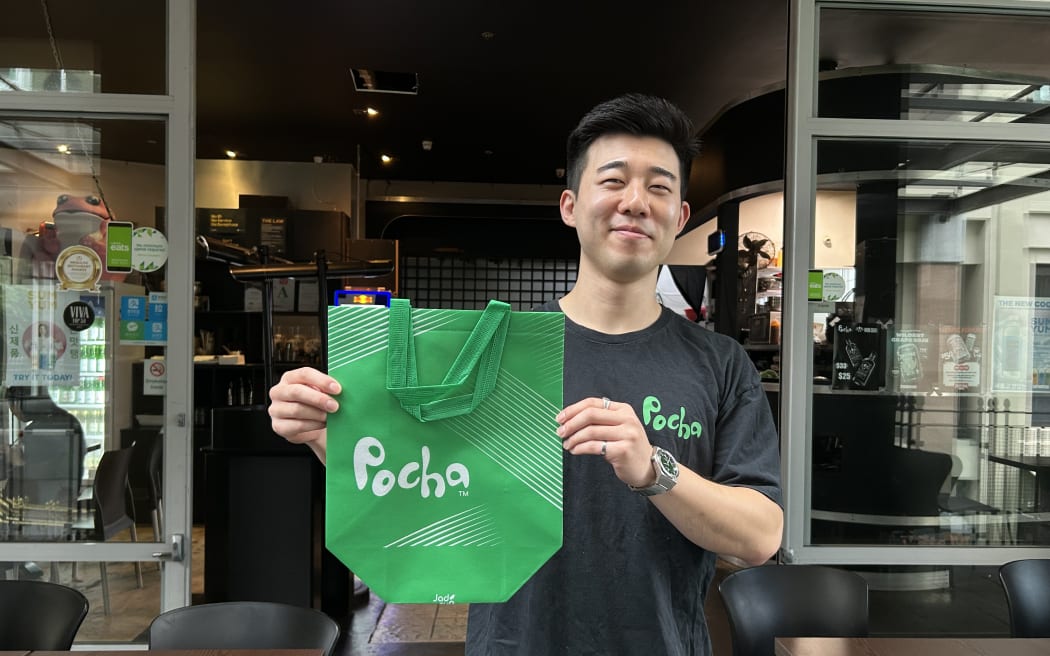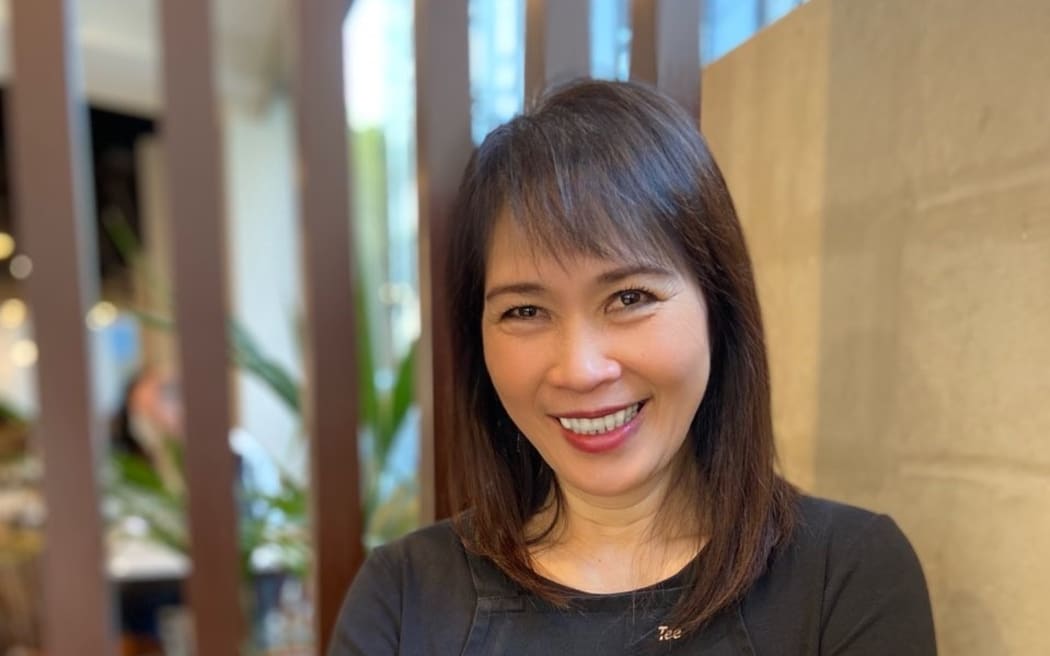
Pocha front of house manager David Lee says attitudes to doggy bags vary by culture. Photo: Ke-Xin Li
Kiwis are cutting back on food wastage by asking for doggy bags, but the attitudes to taking away leftover food from a restaurant can vary between cultures.
Tee Phee, owner of Little Penang in Wellington, has seen more customers taking leftovers home in the past year.
"It would have gone up maybe from 10-15 percent, to now at least 30 percent [of customers take a doggy bag]. You'd be surprised.
"Almost every other table will get a takeaway. Especially lunch time when people don't eat that much, they will ask for a takeaway box when they order and keep that for dinner."

Tee Phee. Photo: Restaurant Association
As her restaurant gets close to celebrating its 15th anniversary, Phee said she was happy to see an improvement in food waste.
"What we instil into our staff is that we discourage customers from over-ordering. I know it's strange, right? It's not just about making money. We just don't like food wastage.
"From day one we have been using paper boxes and not plastic, so from the beginning we have always been advocates for the environment. That's why our policies all aligned in terms of food wastage and in terms of usage of disposables."
Pocha is a Korean restaurant in Auckland's CBD. Front of house manager David Lee admitted he saw fewer customers asking for a doggy bag, but that was not because they were wasting food.
"People are taking it away less just because they kind of eat what's already on the table. I also think that New Zealand was one of the first countries to experience the downturn in the economy. So I think they're quite wary of what they should order.
"So every dollar counts. We also make sure it's a good portion size and that their [customer's] dollars aren't wasted."
Lee said doggy bag attitudes varied by culture.
For example, Korean customers were less likely to need a doggy bag as they know how to cook Korean food at home, and they knew the perfect order size. It was also considered good manners to leave one bite of food on the plate.
Pākehā customers usually order for themselves and take leftovers home in a doggy bag.

Char mee from Little Penang (Supplied/Facebook) Photo:
The Chinese often enjoyed a full dining experience by ordering many different dishes to share so they had a chance to taste everything. They sometimes asked for a doggy bag.
Pasifika customers also ordered a lot of food. They often take leftovers home for their parents and grandparents to try.
Lee said if diners were shy about asking for a bag, staff proactively offered it.
"Most of the time, 80 percent of the time, they'll ask. But there are customers who are a bit cautious about how they may appear. So yes, we always bring up the question like it's always good to be proactive. Because we don't want to throw away what out kitchen made."
Due to high demand for takeaway containers, both Pocha and Little Penang has opted to charge customers around 50 cents for them.
Mekong Baby - a restaurant in Auckland's trendy neighbourhood Ponsonby - made the news in 2018 when its former owner banned doggy bags. But in an email, current owner Jackie Kulak told First Up that was the first thing she changed when she took ownership six years ago.
She said there was a lot of food wastage, and they felt people should be allowed to take their leftovers home.
Now, one out of every four customers at Mekong Baby asked for a doggy bag.

Food in a container. Photo: 123rf
On a Friday night in Auckland's Kingsland, diners said there was no way they would waste their food.
Waiting for their food at Canton Cafe, friends Sophie and Sarah told RNZ they took food waste quite personally.
"We take it home. Maybe not for tonight, because we are going out afterwards. But normally yes, we'll take it home. We both like food."
They would still get their food takeaway even if they had to pay for a doggy bag, because they can not stand waste.
"It annoys me, it's a waste of food. If you're going to pay for it [the food]"
But they would understand if it was bad food.
Tony and Bianca just had a date night at Thai restaurant @Bangkok. They finished everything that night, but otherwise, it would be going into a doggy bag.
Tony said nine times out of 10, he was good at finishing the leftovers sitting in the fridge.
Melody was out celebrating a family member's birthday at The Kingsland.
"What we didn't finish we spread it around to the rest of the family that are still there. We usually eat out in big groups, we don't eat out small."
Despite Kingsland diners' best effort to savor good food, it wa not the case with all Kiwis at all times.
Last year, a week-long programme by the Restaurant Association and Edge impact collected 13 tonnes of food waste from 120 cafes and restaurants. And 43 percent of that - nearly 6 tonnes - came from leftovers on the plate.
Sign up for Ngā Pitopito Kōrero, a daily newsletter curated by our editors and delivered straight to your inbox every weekday.


